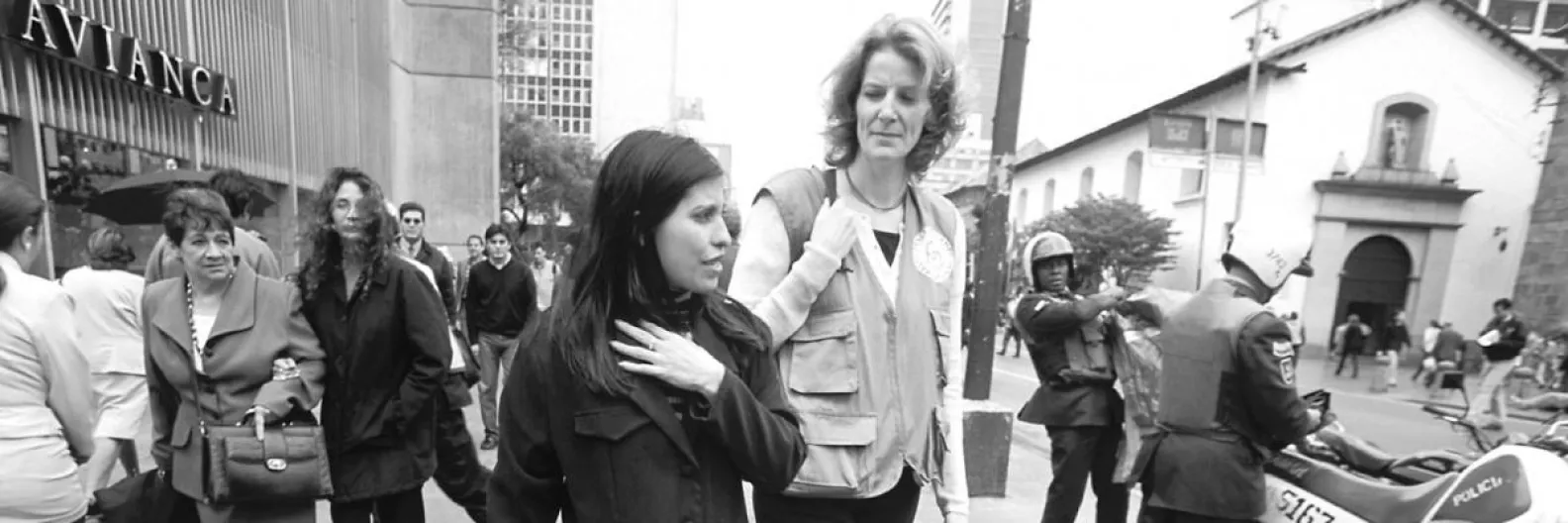
The idea to start Peace Brigades International came from people with practical experience of nonviolence. Especially relevant was the earlier work of the Shanti Sena peace army in India and the World Peace Brigades.
After a number of ad-hoc international peace initiatives, on 12 January 1981 a letter signed by Narayan Desai (Shanti Sena Mandal), Raymond Magee (Peaceworkers), Piet Dijkstra (Foundation for the Extension of Nonviolent Action), Radhakrishana (Gandhi Peace Foundation) and George Willoughby was sent out to a number of organizations. It invited them to attend a conference to revive the idea of an international organization committed to unarmed third party intervention in conflict situations. This led to a meeting that took place on Grindstone Island, Canada from 13 August to 4 September 1981. The participants discussed:
- The experiences of the many previous nonviolent actions;
- The role international peace brigades could play in conflicts,
- Non-partisanship,
- Organisational approaches (build a new organisation, form a new organisation from existing ones, co-ordinate interested groups, or encourage others to act) and,
- The relationship peace brigades could have with the United Nations.
Having taken a decision to set up a new organisation, the meeting discussed the practicalities such as networking, training, project development, fundraising, and the location of a secretariat. The participants approved a founding statement and a structure: a directorate of 4 people and a General Assembly of approximately 25 people, with subcommittees to develop different areas of work. The name agreed upon for the new organization was PEACE BRIGADES INTERNATIONAL.
The first work PBI did was in Nicaragua in 1983, where 10 PBI volunteers interposed themselves between US-backed contras and the Sandinista forces in order to deter hostilities. Subsequently, a PBI team was installed in Guatemala, where work focused on protecting victims and nascent nonviolent organizations in the context of the intense state terror and repression of the Guatemalan civil war. The protection strategy developed in the Guatemala project, consisting of the constant visible presence of a foreign volunteer backed up by an international emergency response network, proved so successful that PBI began to receive many more requests for protective accompaniment from around the world.
Over the following decades, PBI has applied its strategy of protective accompaniment in situations of conflict and human rights abuse in El Salvador, Sri Lanka, Colombia, Haiti, Mexico, Indonesia, Nepal, Kenya, and Honduras. It has also been involved in peace initiatives that focus on supporting dialogue and reconciliation rather than accompaniment. These include a project responding to conflicts in and around Native American communities in the 1990s and participation in the Balkan Peace Team Coalition. PBI focuses on ensuring its strategies are constantly adapted to local situations, and frequently closes projects and opens new ones in response to changing community needs and political realities. PBI currently has field teams in Mexico, Guatemala, Colombia, Honduras, and Kenya, and offers capacity-building support to human rights defenders in Indonesia and in Nepal.
When PBI first started in 1981 there were no country groups--only an International Office, initially in Philadelphia. As PBI field projects expanded throughout the 1980s, numbers grew of ex-PBI volunteers who had returned to their home countries and wanted to stay involved with the work of PBI. Over the years, country groups have been founded in the US and several European countries to support the field projects through volunteer recruitment, fundraising, public education and political support networks.
